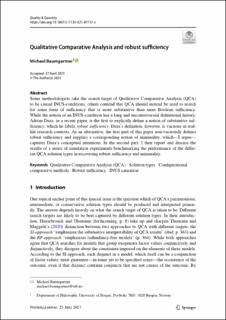Qualitative Comparative Analysis and robust sufficiency
Journal article, Peer reviewed
Published version

Åpne
Permanent lenke
https://hdl.handle.net/11250/2767681Utgivelsesdato
2022Metadata
Vis full innførselSamlinger
- Department of Philosophy [240]
- Registrations from Cristin [9791]
Originalversjon
Quality & Quantity: International Journal of Methodology. 2022, 56 (4), 1939-1963. 10.1007/s11135-021-01157-zSammendrag
Some methodologists take the search target of Qualitative Comparative Analysis (QCA) to be causal INUS-conditions, others contend that QCA should instead be used to search for some form of sufficiency that is more substantive than mere Boolean sufficiency. While the notion of an INUS-condition has a long and uncontroversial definitional history, Adrian Dusa, in a recent paper, is the first to explicitly define a notion of substantive sufficiency, which he labels robust sufficiency. Dusa’s definition, however, is vacuous in real-life research contexts. As an alternative, the first part of this paper non-vacuously defines robust sufficiency and supplies a corresponding notion of minimality, which—I argue—captures Dusa’s conceptual intentions. In the second part, I then report and discuss the results of a series of simulation experiments benchmarking the performance of the different QCA solution types in recovering robust sufficiency and minimality.
